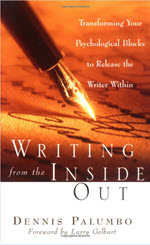Not only fascinating just by being yourself but at peace within.
The inspiration for this post came from Dennis Palumbo’s Writing From the Inside Out: Transforming Your Psychological Blocks to Release the Writer Within
Dennis Palumbo is an award-winning screenwriter (“My Favorite Year”), novelist, and therapist who specializes in working with creative people and their blocks. Take note of his wisdom. It applies not only to artists and writers but to any of you who live (or seek to live) an active, creative life not bogged down in mental torture.
Mental torture? You know, all that mind chatter you and I have? Our judgments about ourselves and others, the constant critiques? The unrelenting quest for self-improvement.
For writers, (or seekers of all kinds) that may include signing up for yet another course that promises to tell you the secret to writing (or to life). Not that there’s anything wrong with courses but at some point, we have to work with what we’ve got. Palumbo says you are enough. Not only enough but actually who people really want. Imagine that? The real you is who people desire.
Who is the real you? How much do you actually know? How much do you show?
Carl Jung told us that what we didn’t explore in ourselves we would meet as fate. Understanding your belief systems will allow you freedom from being limited by them. Or marrying someone who embodies them.
If the real you doesn’t inspire people at first, then keep going. (“It’s hard to beat a person who doesn’t give up,” Babe Ruth). And it’s what you’ve got. Explore your own mind. You’ll find your outer “tribe” as you find your real essence.
Palumbo tells us of a successful screenwriter, pigeon-holed as an idea man, who’s now out of ideas and wants to run off and give it all up.
“You might try writing from a different place,” therapist Palumbo tells him. “Say, starting from character.”
“But I don’t even have a lead character,” the out-of-ideas man says.
“Sure you do. An idea man who thinks he’s run out of ideas.”
“You mean, a guy like me? But what could happen?”
As Palumbo stares off into space, his client realizes he could have that character do all the things he threatened at the beginning of the session: “confess to his wife and kids, find a rabbi, hire a psychic. Etcetera.”
Palumbo argues that all writing is autobiographical even when the story you’re telling isn’t. You can mine your deeper issues through any number of modalities.
If you explore what is within you you’ll create something others not only relate to but actually need for their own growth. Doing so will help you flesh out characters as well as your own life. Rather than being distracted, you can explore your distractions. Assume that life is filled with contradictions and you’re learning to integrate the polarities.
Palumbo tells us:
“Carl Jung said, ‘Neurotics are people who refuse to suffer.’ He was referring to people who respond to life’s painful events by obsessively reliving them, or blaming themselves for not preventing them, or wishing to be someone to whom such things didn’t happen–all to avoid truly experiencing the grief, disappointment, and sense of loss that such events evoke.
From the writer’s standpoint, ‘refusing to suffer’ means that relentless worrying and obsessing…are…less painful…than…writing. (We can substitute the word living.)
(In other words, excessive ruminating isn’t just a type of procrastination. It’s actually a form of self-protection.)” Highlighting is mine.
While this book is addressed to writers, anyone can apply the techniques and be the better for it. Especially if you are an artist/writer or want to be, remember:
“Every hour you spend writing is an hour not spent fretting about your writing.”
“Writing begets writing.”
“Labels exist for the convenience of the labeler.”
What labels have been applied to you? My mother said I was a daydreamer. And she didn’t mean it in a positive way. According to Palumbo, “One person’s daydreamer is another person’s writer-in-training.” Same tendency (daydreaming) different interpretation. When you feel stuck do you call yourself lazy? If you explore the stuckness, you may find that under it is actually fear.
How You can use Palumbo’s wisdom in your own life?
- Notice your judgments.
- Write them down.
- Write down your fears and your assumptions.
- Observe them, write about them. It doesn’t have to be grammatical. Just get it out so you can see it. What’s unconscious controls you and yet looks like reality.
I used this process the other day when I didn’t want to be where I was: bored at the gym. I asked how Palumbo might look at my situation? Yes, I could get up and leave and try to search out a more interesting environment. Or I could examine the situation I was in. What was I overlooking? I was seated at a leg machine and as I looked around I saw rows of feet in varied color sneakers on treadmills. Black tennis shoes were hitting the ramp faster and faster while pinks were more moderate and white’s were in time with the oldies music playing overhead. I began to imagine the lives that went with each set of feet and I forgot that I was feeling stuck because now I was re-animating the world I was actually in.
You can write about your thoughts and experiences whether you’re a professional writer or not. Writing frequently brings clarity. I suggest psychic reading clients write things down rather than carry them around as thoughts. Before a reading, I’ll ask them to write down the questions especially if they think they know them in their minds. All that knowing looks like clutter when I’m honing into their energy to see what’s important. Knowing only takes you so far. It’s when you dive or even tiptoe into the not knowing that it gets interesting.
So much of what we do is push down our feelings and the parts of our lives that look drab. Look closer. You’re not alone. Not even in the writing room. Explore your loneliness. Looking at issues without judgment gives it a kind of grace. Remember the old saying, What you resist, persists? It’s a paradox that allowing something to be can also allow it to leave.
“For a writer, to coin a phrase, nothing’s certain except death and taxes. And envy.” (Feelings are information and worth exploring. We need to bring them with us when we’re writing and not try to avoid or deny them. We have them in common with our readers because we have them in common with humanity.)
Writers have to keep creating and sharing the work whether they get results from the outside world or not. Normally, the definition of insanity is doing the same thing over and over and expecting a different result except the writer has to do that.
What succeeds and when it does is still unpredictable. Therefore, to remain sane, you need to have a vibrant relationship with your creativity that resists the “vagaries of your day-to-day struggles.”
Life, like writing, needs time and patience. Gumption to keep going when it gets hard, finding a way to love the process and not put everything into an unknowable end result. (But you’re a psychic. Aren’t you supposed to guarantee an end result? Recommending the likely consequences of different actions, even actions the client never thought of, can indeed bring different and markedly better results. But we don’t control the universe. What’s best for you may come in circuitous ways. And without the process, you wouldn’t have the richness your soul came in to discover.
Your ego doesn’t like being a beginner. However, In the beginner’s mind, there are many possibilities; in the expert’s mind there are few. (Sazuki)
To be endlessly fascinating is to live in possibility. To explore rather than assume.Start by noticing and what’s around you. Really stop and see, write it down. Your interior life may be like that black space that the Hubble telescope revealed is actually filled with billions of stars. They were there. We just needed a way to see.

Writing from the Inside Out, by Dennis Palumbo (Amazon link)

